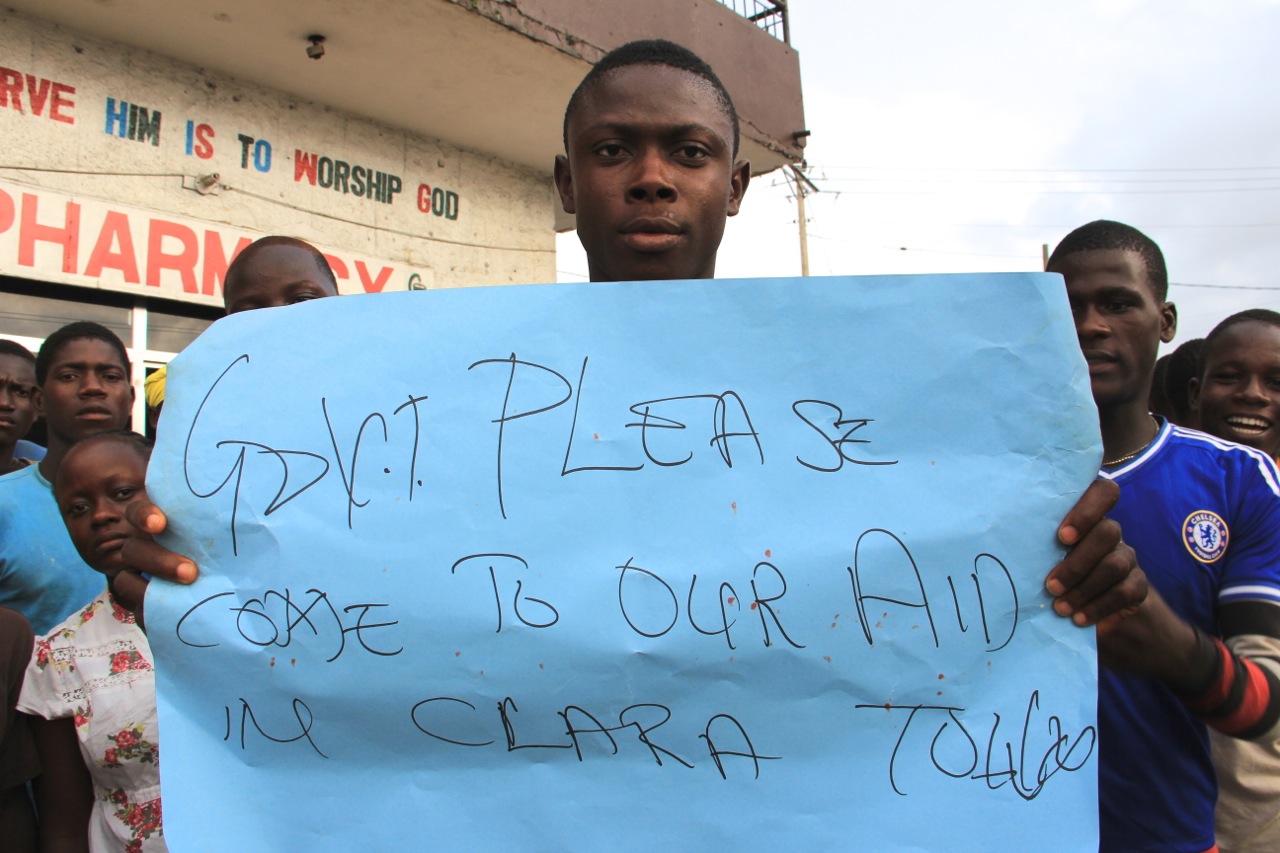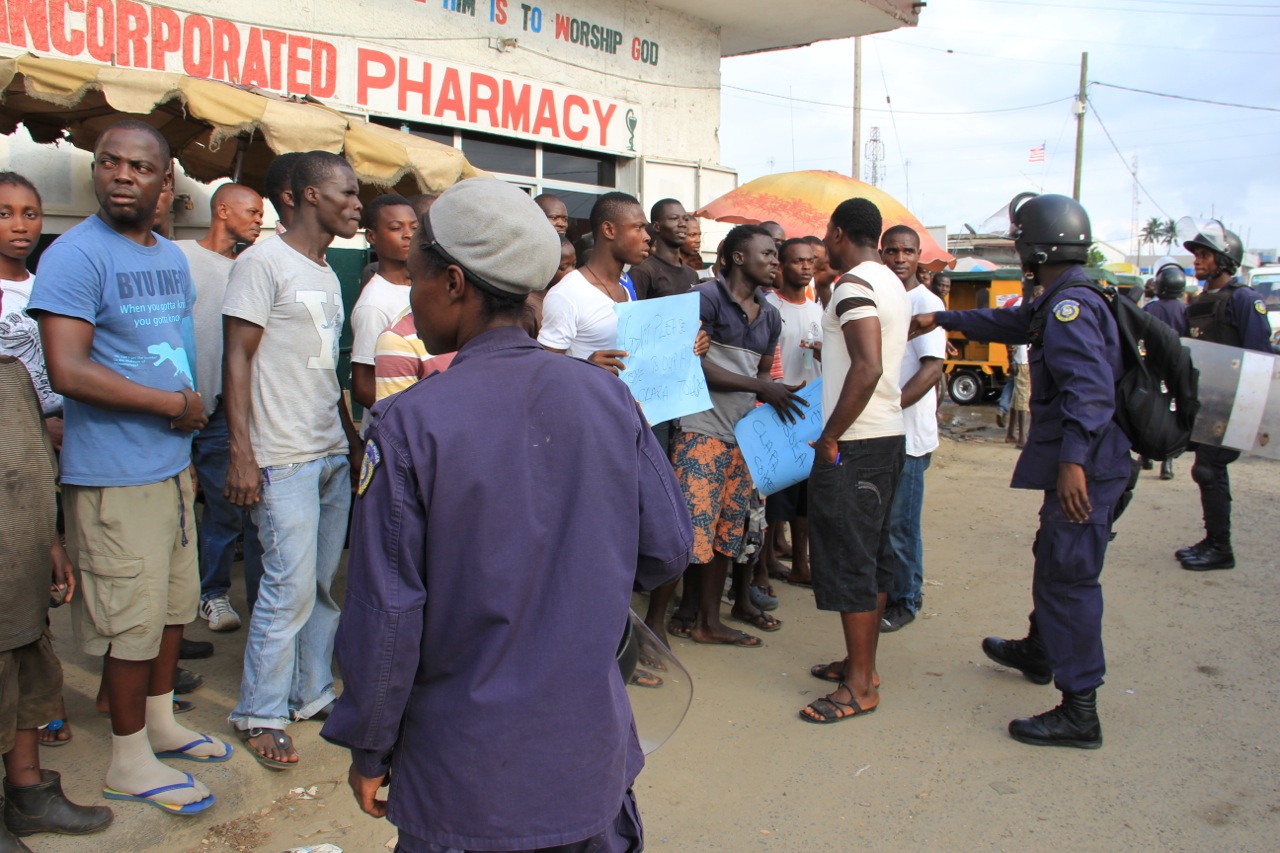Ebola Outbreak Feeds on Fear, Anger, Rumors
As protestrs call for action, families fear letting sick relatives get care.
MONROVIA, Liberia— -- As the number of new infections and deaths rise in the Ebola outbreak, fear and suspicion is rising, too, making it more difficult for health care workers to get the sick into hospitals, even as increasingly angry crowds are calling for more government action.
The growing chaos caused by this current Ebola outbreak, which is already the worst on record with more than 1,300 infected and 700 dead in three countries in West Africa, was witnessed by ABC News in Clara Town, a low income community in the Bushrod Island area of Monrovia.
On UN Drive, a car with police in riot gear slowly crossed the Gabriel Tucker bridge to go onto Bushrod Island.
Some minutes later, those officers were standing on a median looking at a group of mostly young men holding homemade signs that read, "Govt please come to our aid in Clara Town"
The men explained that community members had called the Health Ministry to come pick up the body of a man who had been dead in his home since Thursday. Late Friday or early Saturday, a woman had died in the same neighborhood, and she was also still in her home. Both were suspected Ebola deaths, and the protesters wanted the government to remove them.
Get All the ABC News coverage on the Ebola Outbreak Including Videos, News, and Explainers
Ebola: What you need to know about the deadly outbreak
Nearly 1 in 3 of all Ebola deaths in the last 40 years… have occurred since March
What is Ebola? How does it spread? Who is at risk? What you need to know
A man in the crowd said that since they called the government on Thursday, workers had come to examine the scene, but they had not returned. He said that if the government did not respond to the request of community members to remove the bodies, there would be serious consequences.
"From Monday, the entire Clara Town will be right here. No car will go into town, trust us," he said.
UN Drive is a hub of activity, and it is the main road that leads from many different parts of Bushrod Island into central Monrovia.
Fred D. Weah, a young man who seemed to be a leader of the group, led chants about the youth of Clara Town protecting their neighborhood and not being afraid of the police. The protesters chanted about not wanting any brutality, but said they would return it if it was inflicted upon them.

As the chants got louder and the group got bigger, the riot police crossed the street and asked the protesters to move back from the road and onto the sidewalk. Some of them yelled at the police, but they moved back onto the sidewalk.
A protester said that he and the others were standing on the road because Liberian President Ellen Johnson Sirleaf had driven that way and they wanted to draw attention to what was happening in Clara Town.

When they heard that an ambulance had arrived in Clara Town, the group moved down UN Drive and turned onto a dirt road. The women in the Clara Town market looked on as protesters and journalists walked down the road towards the neighborhood where the two people had died.
Dozens of people stood on both sides of an ambulance, watching as two health care workers put on protective suits.
They painstakingly checked and rechecked their suits and their disinfecting equipment, and they left the group, spraying the dirt as they walked the narrow path between houses. They passed a small concrete house with a yellow wooden window, and stopped to recheck their gear at a forest green home on the left. A young man said that those were the homes of the dead.
The health care workers joined three men waiting outside of the house and as the men stood back, the workers knocked on the red metal door. Someone opened the door and the workers spoke to the person.
After some time, the people in the house closed the door and the workers turned away.
Another man told the health care workers that they either take the bodies or the sick, but they would not be permitted to leave Clara Town empty-handed.
The men who had stood on UN Drive and said they wanted a peaceful protest tried but could do little to calm the angry group who had blocked the path of the ambulance.
The health care workers occasionally tried reasoning with the crowd, and at other times they just sat in their vehicle, unable to drive away. These men were now bearing the brunt of a community's frustration with a government many said they felt wasn't doing enough to protect them from a deadly virus.
In the past week, the government of Liberia has begun to enact some solid measures to contain the virus that has been spreading for months. Last Sunday, President Sirleaf held the first meeting of a National Ebola Task force. In the second task force meeting last Tuesday, many attendees said that the fight against Ebola could only be won by a joint effort of the affected countries and the larger international community.
"It really is beyond the capacity of the government of Liberia to control this outbreak," said a high-level diplomat at the Tuesday meeting.
With more than 700 dead, the current Ebola epidemic is the largest to date, according to the World Health Organization. The containment of this outbreak is proving to be a seemingly insurmountable task for the government of Liberia to handle on its own.
Because hospitals were the locations in which the Ebola virus seemed to be spreading the most easily, some of them have temporarily shut their doors to the public.
As of Saturday, two out of four of Liberia’s major hospitals - John F. Kennedy and Saint Joseph’s Catholic Hospital - are no longer accepting patients and some smaller clinics have shut down as well. There are reports that the ELWA hospital emergency room was temporarily closed.
The closures have dealt a severe blow to Liberia’s already struggling health system, leaving many citizens of Monrovia concerned about where they could go for emergency care. For now, smaller clinics and hospitals are bearing the weight of treating the country's citizens.
President Sirleaf has appealed for help from the international community, and in a speech on Wednesday, Sirleaf announced the creation of a National Action Plan that would mobilize the Liberian government to curb the spread of Ebola.
“We have announced a number of stringent preventive measures, issued standing orders to our security forces and restricted movements internally and externally. We will continue to do more as the situation requires,” she said.
Sirleaf requested that people avoid gathering in large groups, as that is a means by which the Ebola virus could potentially spread. But on Saturday evening in Clara Town, in response to what many deemed the government's sluggish response to their request, the community members did just that.
"You're protected more than me," a man yelled repeatedly at a health care worker.
Later, the same worker tried to talk to another man and told him, "Your patient locked the door, how do you expect us to enter?"
The man replied that the Ebola team should have called the police.
"There's an iron gate there, you're not expecting us to burst the door," the worker argued.
As the light began to fade in Clara Town, the worker expressed frustration about the fact that this incident was preventing him from doing his job.
"We've got so many cases all over. They're calling us," he said.
This type of situation can have a multiplying effect, as delays such as this one could cause health care workers to miss other appointments and cause other community members to become incensed and react in ways similar to the people of Clara Town.
At the Task Force Meeting on Tuesday, a senior official from the Ministry of Health said that citizens contribute to the problem of the slow retrieval of bodies in another way because they call the Ministry to pick up the bodies of people who haven’t died from Ebola, and this distracts the removal teams from their actual mission.
Amidst the noise in Clara Town, the health worker who had tried to reason with the crowd said he had called the Ministry of Health and that they were sending a vehicle to pick up the two bodies.




